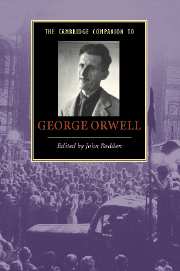Book contents
- Frontmatter
- 1 A political writer
- 2 Orwell and the biographers
- 3 Englands His Englands
- 4 The truths of experience: Orwell’s nonfiction of the 1930s
- 5 The fictional realist: novels of the 1930s
- 6 Orwell’s essays as a literary experience
- 7 ‘My country, right or left’: Orwell’s patriotism
- 8 Orwell and the British Left
- 9 Orwell, anti-Semitism and the Holocaust
- 10 Orwell, Socialism and the Cold War
- 11 Animal Farm: history as fable
- 12 Nineteen Eighty-Four: context and controversy
- 13 Orwell, the academy and the intellectuals
- 14 Orwell for today’s reader: an open letter
- 15 George Orwell: a bibliographic essay
- 16 Why Orwell still matters
- Further reading
- Index
1 - A political writer
Published online by Cambridge University Press: 28 July 2007
- Frontmatter
- 1 A political writer
- 2 Orwell and the biographers
- 3 Englands His Englands
- 4 The truths of experience: Orwell’s nonfiction of the 1930s
- 5 The fictional realist: novels of the 1930s
- 6 Orwell’s essays as a literary experience
- 7 ‘My country, right or left’: Orwell’s patriotism
- 8 Orwell and the British Left
- 9 Orwell, anti-Semitism and the Holocaust
- 10 Orwell, Socialism and the Cold War
- 11 Animal Farm: history as fable
- 12 Nineteen Eighty-Four: context and controversy
- 13 Orwell, the academy and the intellectuals
- 14 Orwell for today’s reader: an open letter
- 15 George Orwell: a bibliographic essay
- 16 Why Orwell still matters
- Further reading
- Index
Summary
George Orwell was primarily a political writer. In his essay 'Why I Write' (1946), Orwell stated he wanted 'to make political writing into an art'. While he produced four novels between the years 1933 and 1939, it was clear that his real talent did not lie in traditional fiction. He seems instinctively to have understood that the documentary style he developed in his essays and his semi-autobiographical monograph, Down and Out in Paris and London (1932), was unsuitable to the novel format. Ultimately, the reason for this is simple - what profoundly interested Orwell were political questions. His approach to politics evolved during the decade of the 1930s along with his own idiosyncratic journey from English radical to his unique, eccentric form of socialism.
Orwell claimed he had an unhappy youth. If one believes the memories of those like his neighbour Jacintha Buddicom, who knew him as a carefree, fun loving young boy, Orwell's claim of unhappiness seems exaggerated. In his essay 'Such, Such Were the Joys', he portrays his school, St Cyprian's, as an unpleasant amalgam of snobbery, bullying and petty acts of tyranny. The truth lies somewhere between these two extremes, something Orwell himself understood. 'Whoever writes about his childhood must beware exaggeration and self-pity', he wrote of his years at St Cyprian's.
Orwell's experiences at Eton were more positive. Although he failed to distinguish himself academically, he received a solid education, one that he drew on for the rest of his life. But what is true is that in these years Orwell first began to carve out for himself the persona of the outsider, a role he would play the rest of his life.
- Type
- Chapter
- Information
- The Cambridge Companion to George Orwell , pp. 1 - 11Publisher: Cambridge University PressPrint publication year: 2007
- 1
- Cited by

